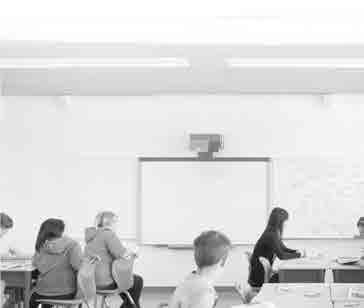
14 minute read
Lesson 1 In School
8

IN SCHOOL
VOCABULARY
1 Look at the plan of a school. Find the right words.
1 a room where pupils have their lunch 2 a room where you get ready for PE class 3 a room for teachers 4 a place where you leave your shoes, jacket and other things 5 a room where you do experiments 6 a room where you paint and draw 7 a room for the headmaster 8 a room where you can fi nd a lot of books
Gym
Cathy’s classroom
Art classroom
ground fl oor
Boys, changing room Classroom
Girls, changing room Computer room 1 Classroom
First fl oor
Science lab
English classroom
Music classroom
Mike’s classroom Lockers
Toilets
Toilets
Computer room 2 Stairs
Entrance
Stairs
Computer School kitchen
Canteen
Lockers
Library
room 3 Staff room Headmaster’s offi ce
Lesson 1
2 Look at the plan of the school.
Choose the correct word.
3 Work with a friend. Ask and answer.
4 Draw a plan of your school. Present it in class.
between next to opposite
1 The lockers are (next to/between) the canteen. 2 The science lab is (next to/opposite) the music classroom. 3 The staff room is (between/opposite) the computer room and the headmaster’s offi ce. 4 Mike’s classroom is (between/opposite) the English classroom. 5 The art classroom is (opposite/next to) Cathy’s classroom. 6 The computer room 1 is (opposite/next to) the girls’changing room.
A: Is the science lab next to the toilets? B: Yes, it is. A: Wrong answer! OR A: Where is the science lab? B: Opposite the music classroom. A: Correct!
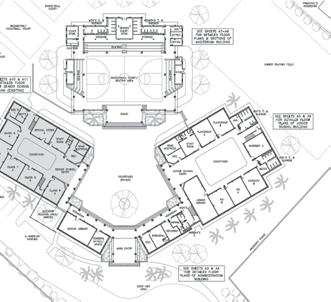
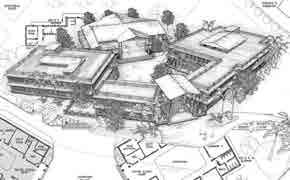
VocabuLaRy box
a canteen [k2n9tI:n] a gym [dzim] a headmaster [0hed9m4:st3] a library [9laibr3ri] a locker [9lAk3] a science lab [sai3ns l2b]
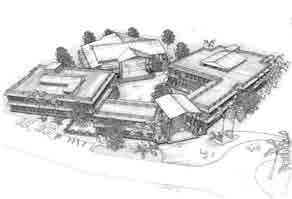
9
LISTENING
1 Have a look on Emma’s school’s website below.
Ask and answer in pairs.
1 What’s her school called? 2 Where is it? 3 How many students are there? 4 How many students are there in each class? 5 What kind of activities can you do? 6 How many subjects are there all together? 7 What subjects or activities can you see in the pictures?


10 gReeN BusH sCHOOl
Address: 15 Park Road, Liverpool size: 300 students size per class: 18 Type: Day School
subjects: Art, Biology, Chemistry, Design and Technology, English Language, English Literature, French, German, Latin, Geography, IT, History, Mathematics, Music, PE, Physics Activities: Chess, Choir, Computing / IT, Public Speaking, 1st Aid, Orchestra, Drama Group, Film Club, Swimming Facilities: Science Lab, Library, Art and Design Room, Sports Hall, Computer Room, Canteen, Football Pitch, Tennis Court staff: Headmaster Mr Henry Black
Lesson 1
2 Listen and complete the sentences.
1 There are a lot of photos on the ... a) poster b) school’s website c) wall 2 They have different rooms a) in different buildings b) for different activities c) for different subjects 3 Literature is more about ... a) writing b) spelling c) reading 4 Three mistakes in a test and you get a(n) ... a) E b) B c) C



a court
[kc:t ]
a pitch
[pitS]
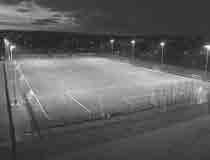
3 Answer the questions about your own school.
1 Are there more than 200 pupils in your school? 2 Is there a sports hall in your school? 3 Is there a playground next to the school? 4 Are there any posters on the wall in your English classroom? 5 Do you like literature? Why? 6 Is there a very srict teacher in your school?
VocabuLaRy box
an activity [2k9tivitI] an aid [eid] a facility [fC9silCti] Biology [bai9Al3dzi] Chemistry [9kemistri] a choir [kwai3] an orchestra [9c:kistr3] Physics [9fixiks] Technology [tek9nAl3dzi]
11
RemembeR! There is ... / There are ...
Ми розпочинаємо речення зі структур ‘There is’ / ‘There are’ тоді, коли говоримо про речі / особи / явища, котрі можемо знайти у певному місці. There is a new Computer Room. There is = There’s Is there a canteen in your school? There are 300 students in our school. Are there any strict teachers in your school?
4 Read and answer the question below.

Do you KnoW?
In the USA and some other countries parents sometimes take a role of teachers and teach their children at home. Why do parents do this? They don’t like regular schools. They believe1 that there are too many students in the class or that there is too much bullying. In other cases2 , children whose parents spend a lot of time travelling can’t go to regular schools. There are over a million children in the USA whose parents are also their teachers.
zzWhy do some parents teach their children at home?
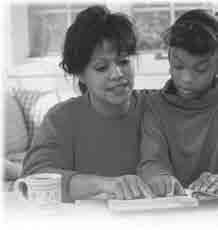
12
1to believe [bi9lI:v] — вважати 2a case [keis] — випадок
VocabuLaRy box
bullying [9bUliN] regular [9regjUl3] talented [9t2l3ntid]
Lesson 1
READING
1 Listen and read, then say what there is in the new part of the school.
Stella: And what’s your favourite subject? Emma: IT and Art. Stella: IT. What’s IT? Emma: Information Technology. Mr Jones teaches IT. He’s great. Stella: Is he young? Emma: Well, youngish, I’d say. But he is nice and fair. He always makes us laugh. And there is a new IT room. It’s great. There are 20 computers and a big screen. Stella: What is a Day School? You don’t go to school at night, do you? Emma: Ha, ha! No, it means my school is not a boarding school. Boarding schools are schools where children live. They go home only for holidays. We stay at school from 8.30 until 4 o’clock, as you know. Stella: There are a lot of activities you can choose from. Emma: Yes, I’m in the Drama Group and the Film Club. Stella: Sounds interesting. Emma: I’II show you around. The old part of the school is a bit shabby. The new part of the school is modern and spacious. It’s really nice. There’s an IT room, a Science lab and an Art room on the fi rst fl oor and there is a fl oor and there is a library and a canteen close to the entrance. Stella: Oh, it’s getting late. You must be hungry. Let’s have hungry. Let’s have something to eat.


13
2 Say if the sentences are true or false.
1 IT and Art are Stella’s favourite subjects. 2 Mr Jones teaches English. 3 Mr Jones is a very strict teacher. 4 Emma goes to a boarding school. 5 Emma doesn’t like acting. 6 The canteen and the IT room are on the second fl oor.
VocabuLaRy box
boarding [9bc:diN]
school
fair [fe3] shabby [9S2bi] spacious [9speiSes] to mean [mI:n] zzto be close (to) zzto show around
3 Work in pairs. Practise reading the dialogue on page 13. RemembeR!
Words to describe
a school building
Words to describe
teachers
It’s big nice modern spacious shabby He / She is nice strict fair kind young(ish)
4 Listen to task 2 on page 11 again. Fill in the missing words.

14
Emma’s school is called ... . It’s a day school because children stay at school from 8.30 until ... . There ... 300 students in her school. The school is quite big. The old part is a bit ... , but the new part is modern and ... . There is a ... lab, library, ... room, and there’s a canteen close to the entrance. Emma’s favourite subjects are ... and ... . Some of the teachers are ... , like Mr Beard. He always says that ... and ... are very important. Students like fair ... like Mr ... . He ... IT and he often makes students ... .
Lesson 1
5 a) Read and say what is unusual in this school.
SCHOOL OF THE AIR
Sarah and her brother live in Australia. The nearest school is 400 km away from their home, so they learn at home. Their school is called School of the Air. It fi rst used radio. Now, it is using satellite1 technology. The teachers teach at one of the teaching studios. They use a video camera and an electronic whiteboard. Students have a small web camera on their computers. Students write emails to teachers and other students. They can see them on the screen2 and talk to them over a microphone3. They get a chance to meet their ‘screen’ classmates once a year at a sports day or at a school camp.
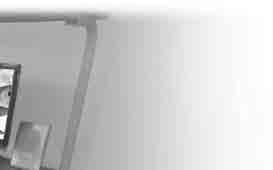
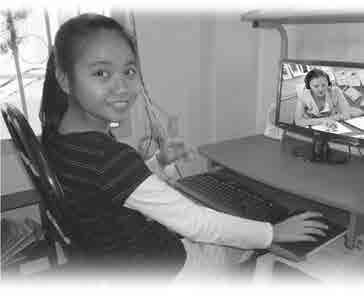
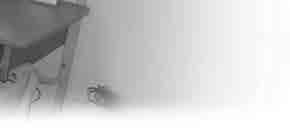
b) In groups discuss the items below. b) In groups discuss the items below.
zzWould you like to study at School of the Air? zzDo you think the pupils miss their classmates?

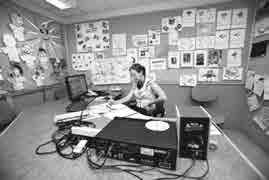
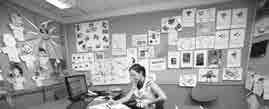
1a satellite [9s2tilait] — n.: супутник, adj. супутниковий 2a screen [skrI:n] — екран 3a microphone [9maikrCfCUn] — мікрофон
15
16
GRAMMAR
RemembeR!
zzМи вживаємо must (або have to) для вираження необхідності.
I must do my homework. (My teacher gets angry when I don’t do it)
I have to do my homework. zzМи вживаємо mustn’t для вираження заборони, недозволеності.
We mustn’t bring pets to school. Read § 8,
pp. 206-207. Read § 8, p. 208.
1 Complete with ‘must’ or ‘mustn’t’.
Teenagers… 1 … spend long hours at the computer. 2 … do their homework on time. 3 … smoke or drink acohol. 4 … learn to be kind to others. 5 … look neat and tidy. 6 … be rude1 . 7 … skip breakfast. 8 … use their mobile phones in schools.
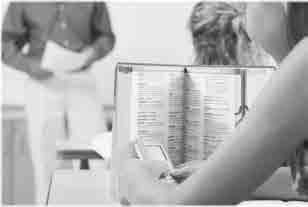
RemembeR!
zzМи вживаємо needn’t для вираження відсутності у потребі або необхідності. You needn’t take a coat. It’s warm outside. We needn’t study for the test because the teacher has cancelled2 it. 1rude [ru:d] — неввічливий, брутальний 2to cancel [9k2nsl] — скасовувати
Lesson 1
2 Complete with the correct or the best answer.
1 … to go now? a) Must we b) Do we have c) Mustn’t we 2 Pupils … eat their lunches outside the canteen. a) needn’t b) mustn’t c) don’t have to 3 … to help with the food and drinks at the party next Friday? a) Did you have b) Must you c) Will you have
3 Complete the sentences so they are true for you.
Use: must, mustn’t, needn’t, have to, don’t have to.
(More than one choice is possible for some sentences.)
1 I … wash the family car every week. 2 I … ask for more pocket money than my parents can give me. 3 You … take your umbrella. It won’t rain. 4 I … wear dirty or funny clothes to school. 5 I … study harder to get better marks. 6 I … go out now.
4 Choose the correct answer.
Naomi: Barbara, are you ready to go to the concert? We (needn’t / have to) leave now. Oh, and don’t forget the tickets.
Barbara: Naomi, you don’t (have to / mustn’t) tell me every two minutes. Do we (have to / must) take chairs? Isn’t the concert in the park?
Naomi: No, we (don’t have to / mustn’t) take chairs. There will be chairs there. By the way, we (mustn’t / needn’t) forget to take sandwiches with us.
Barbara: Well, let’s hurry up! We (don’t have to / mustn’t) be late!
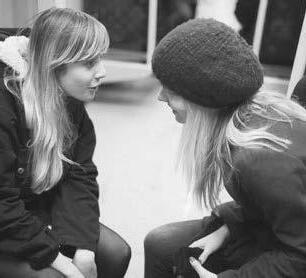
17
SPEAKING
1 Look at the rules and complete the sentences on page 19.
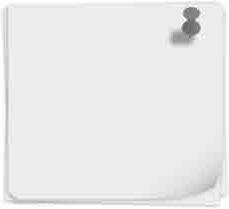

sCHOOl uNIFORMs
Wear the full uniform (a white shirt, a green pullover, black shoes (no trainers). zzGirls — black skirts (no mini skirts, make up or jewellery). zzBoys — black trousers, a tie.

BIKes and IN-lINe sKATes
zzLeave your bike locked on the bike rack. zzWear a helmet. zzYou must have working front and back brakes. zzNo kind of wheels are allowed inside the building.
NOTICe TO PuPIls
zzCome to school on time. zzDon’t make noise in the corridors. zzStay in the playground during breaks.


Notice to Pupils

PeTs zzDo not bring your pets to school.
gAdgeTs
zzSwitch off your mobile phones. zzDo not bring iPods to school.
18

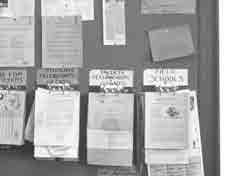
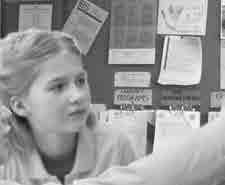

Lesson 1
1 Pupils have to come to school on ... 2 They have to stay in the ... during breaks. 3 Girls have to wear ... , ... , ... and ... . 4 Boys have to put on ... , ... , ... , ... and ... . 5 Girls mustn’t wear ... , ... or ... . 6 Pupils mustn’t bring ... or ... to school. 7 They mustn’t make ... in the corridors. 8 Pupils mustn’t use their mobile ... .
2 Read the dialogues and complete them with ‘must’ or ‘mustn’t’. Then listen to check your answers. dialogue 1
Miss Pott: ...and then he set off to run 42 km to bring the news of the Greek victory... . (Dring-dring...). ... because there were NO mobile phones then!
Emma: Sorry, Mrs Pott. It’s mine. (Dring-dring).
Miss Pott: Emma, you ... switch it off.
Emma: It is switched off. I think it’s yours, Mrs Pott.

dialogue 2
Pino: A new helmet. Cool!
Tim: Yes, it costs a fortune. I ... fi x my back brake now.
Pino: Yeah, a new rule. And you ... leave your bike here.
Tim: Yes, I know. Off I go — to the bike rack. Ouch!
Pino: He ... REALLY fi x his back brake.

dialogue 3
Lee: What subject do we have fi rst? (Peter has headphones on.)
Peter: To-to-to-to-to (He is listening to the iPod, drumming with his pencils.)
Lee: Peter, PETER! Turn it down!!!
Peter: Are you talking to me?
Lee: YEES! You ... turn it off. Mr Beard is coming.

19
3 Work in pairs. Read the dialogues, then choose one and act it out.
4 a) Read the phrases and sort them out in 3 groups.
chew gum, skip classes, stand up when the teacher comes into the class, tidy up the class after the lesson, wear school uniforms, bring a letter from a doctor when you are ill, eat and drink in the library, do homework every day, stay longer if you break the rules, walk on the left in the corridor, go out during breaks
We have to (We must) We don’t have to We mustn’t
IN MY SCHOOL
b) Work in pairs. Ask and answer the questions.
A: Can you chew gum in your school?
B: No, we can’t. We mustn’t chew gum in school.
5 Work in groups. Share your opinions about school.
20
Oh, school is the best thing in the world! There’s ... It’s ... I ... Do I love school? Do I love school? I don’t know. Of course, ... But sometimes ... Oh, no! I don’t like school. I have some problems with ... I hate ...
WRITING Lesson 1
LeaRning Tip
HOW TO DESCRIBE A PLACE 1 What it looks like: a) which fl oor the room is situated on; b) its size (how long, high and wide it is); c) if there is a balcony or there are windows; d) what colour the walls are and how the room is decorated; e) the furniture; f) the equipment. 2 What kind of lessons or activities are held in it. 3 What special thing there is in this room. 4 How many people the room can hold. 5 What feelings and emotions you experience in this place.
1 Describe one of your classrooms.
2 Write about your school. Use the text in task 1 on page 13 as an example.
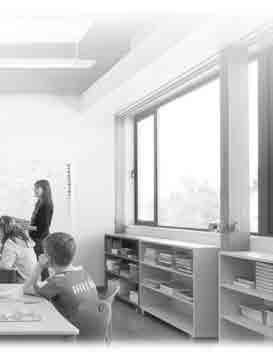
21
